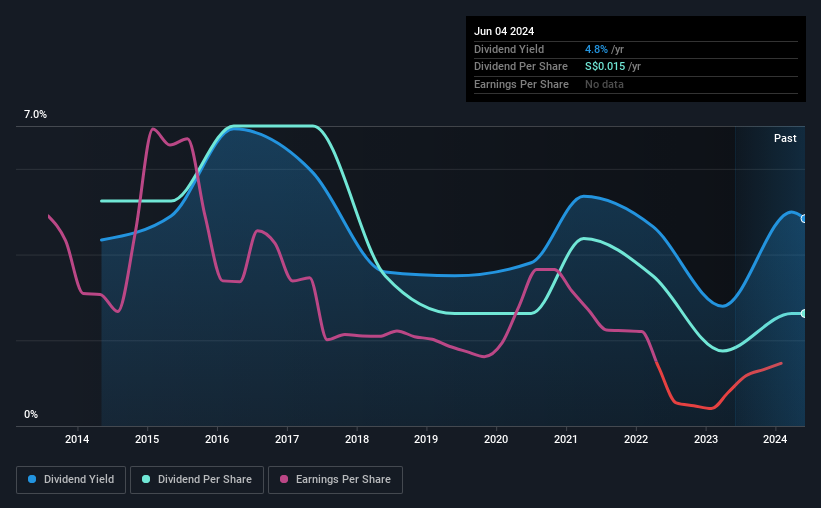- Singapore
- /
- Real Estate
- /
- SGX:F1E
Low Keng Huat (Singapore) (SGX:F1E) Is Increasing Its Dividend To SGD0.015
Low Keng Huat (Singapore) Limited (SGX:F1E) will increase its dividend on the 21st of June to SGD0.015, which is 50% higher than last year's payment from the same period of SGD0.01. This takes the annual payment to 4.8% of the current stock price, which is about average for the industry.
See our latest analysis for Low Keng Huat (Singapore)
Low Keng Huat (Singapore)'s Distributions May Be Difficult To Sustain
Unless the payments are sustainable, the dividend yield doesn't mean too much. Even though Low Keng Huat (Singapore) isn't generating a profit, it is generating healthy free cash flows that easily cover the dividend. We generally think that cash flow is more important than accounting measures of profit, so we are fairly comfortable with the dividend at this level.
Looking forward, earnings per share could fall by 41.2% over the next year if the trend of the last few years can't be broken. While this means that the company will be unprofitable, we generally believe cash flows are more important, and the current cash payout ratio is quite healthy, which gives us comfort.

Dividend Volatility
The company's dividend history has been marked by instability, with at least one cut in the last 10 years. The dividend has gone from an annual total of SGD0.03 in 2014 to the most recent total annual payment of SGD0.015. The dividend has shrunk at around 6.7% a year during that period. Generally, we don't like to see a dividend that has been declining over time as this can degrade shareholders' returns and indicate that the company may be running into problems.
Dividend Growth Potential Is Shaky
Dividends have been going in the wrong direction, so we definitely want to see a different trend in the earnings per share. Earnings per share has been sinking by 41% over the last five years. Dividend payments are likely to come under some pressure unless EPS can pull out of the nosedive it is in.
The Dividend Could Prove To Be Unreliable
In summary, while it's always good to see the dividend being raised, we don't think Low Keng Huat (Singapore)'s payments are rock solid. In the past, the payments have been unstable, but over the short term the dividend could be reliable, with the company generating enough cash to cover it. We would probably look elsewhere for an income investment.
Market movements attest to how highly valued a consistent dividend policy is compared to one which is more unpredictable. Meanwhile, despite the importance of dividend payments, they are not the only factors our readers should know when assessing a company. To that end, Low Keng Huat (Singapore) has 3 warning signs (and 2 which are potentially serious) we think you should know about. Is Low Keng Huat (Singapore) not quite the opportunity you were looking for? Why not check out our selection of top dividend stocks.
The New Payments ETF Is Live on NASDAQ:
Money is moving to real-time rails, and a newly listed ETF now gives investors direct exposure. Fast settlement. Institutional custody. Simple access.
Explore how this launch could reshape portfolios
Sponsored ContentNew: AI Stock Screener & Alerts
Our new AI Stock Screener scans the market every day to uncover opportunities.
• Dividend Powerhouses (3%+ Yield)
• Undervalued Small Caps with Insider Buying
• High growth Tech and AI Companies
Or build your own from over 50 metrics.
Have feedback on this article? Concerned about the content? Get in touch with us directly. Alternatively, email editorial-team (at) simplywallst.com.
This article by Simply Wall St is general in nature. We provide commentary based on historical data and analyst forecasts only using an unbiased methodology and our articles are not intended to be financial advice. It does not constitute a recommendation to buy or sell any stock, and does not take account of your objectives, or your financial situation. We aim to bring you long-term focused analysis driven by fundamental data. Note that our analysis may not factor in the latest price-sensitive company announcements or qualitative material. Simply Wall St has no position in any stocks mentioned.
About SGX:F1E
Low Keng Huat (Singapore)
An investment holding company, engages in property development, hotel, and investment business in Singapore, Australia, and Malaysia.
Excellent balance sheet and good value.
Market Insights
Weekly Picks

THE KINGDOM OF BROWN GOODS: WHY MGPI IS BEING CRUSHED BY INVENTORY & PRIMED FOR RESURRECTION


Why Vertical Aerospace (NYSE: EVTL) is Worth Possibly Over 13x its Current Price


The Quiet Giant That Became AI’s Power Grid
Recently Updated Narratives


A tech powerhouse quietly powering the world’s AI infrastructure.


Keppel DC REIT (SGX: AJBU) is a resilient gem in the data center space.


Why Vertical Aerospace (NYSE: EVTL) is Worth Possibly Over 13x its Current Price
Popular Narratives


MicroVision will explode future revenue by 380.37% with a vision towards success


Crazy Undervalued 42 Baggers Silver Play (Active & Running Mine)






